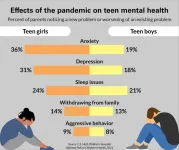Engineers combine AI and wearable cameras in self-walking robotic legs
2021-03-15
(Press-News.org) Robotics researchers are developing exoskeletons and prosthetic legs capable of thinking and moving on their own using sophisticated artificial intelligence (AI) technology.
The system combines computer vision and deep-learning AI to mimic how able-bodied people walk by seeing their surroundings and adjusting their movements.
"We're giving robotic legs vision so they can control themselves," said Brokoslaw Laschowski, a PhD candidate in systems design engineering who leads a University of Waterloo research project called ExoNet.
Exoskeletons and prosthetic devices operated by motors already exist, but users must manually control them via smartphone applications.
"That can be inconvenient and cognitively demanding," said Laschowski, a student member of the Waterloo Artificial Intelligence Institute (Waterloo.ai). "Every time you want to perform a new locomotor activity, you have to stop, take out your smartphone and select the desired mode."
To address that limitation, the researchers fitted exoskeleton users with wearable cameras and are now optimizing computer software to process the video feed to accurately recognize stairs, doors and other features of the surrounding environment.
The next phase of the ExoNet project will involve sending instructions to motors so that robotic legs can climb stairs, avoid obstacles or take other appropriate actions based on analysis of the user's current movement and the upcoming terrain.
"Our control approach wouldn't necessarily require human thought," said Laschowski, who is supervised by engineering professor John McPhee, the Canada Research Chair in Biomechatronic System Dynamics. "Similar to autonomous cars that drive themselves, we're designing autonomous exoskeletons and prosthetic legs that walk for themselves."
The researchers are also working to improve the energy efficiency of motors for robotic exoskeletons and prostheses by using human motion to self-charge batteries.
INFORMATION:
The latest in a series of papers on the related projects, Simulation of Stand-to-Sit Biomechanics for Robotic Exoskeletons and Prostheses with Energy Regeneration, appears in the journal IEEE Transactions on Medical Robotics and Bionics.
The research team also includes engineering professor Alexander Wong, the Canada Research Chair in Artificial Intelligence and Medical Imaging, and William McNally, also a PhD candidate in systems design engineering and a student member of Waterloo.ai.
[Attachments] See images for this press release:

ELSE PRESS RELEASES FROM THIS DATE:
2021-03-15
In 2016, a collaborative group of research and education specialists received funding from the National Science Foundation for the project 'Building a Comprehensive Evolutionary History of Flagellate Plants' -- also known as 'Genealogy of Flagellate Plants' (GoFlag). Members of the team have the ambitious goal of reconstructing the 470-million-year history of one of the most diverse groups of land plants on the planet.
The first of several forthcoming publications from the project was published in a recent issue of Applications in Plant Sciences. In their inaugural article, the researchers report on the successful development of 451 nuclear target enrichment probes, which correspond to short, variable loci.
By creating a standard ...
2021-03-15
When rain began falling in northern Georgia on Sept. 15, 2009, little did Atlantans know that they would bear witness to epic flooding throughout the city. Neighborhoods, like Peachtree Hills, were submerged; Georgia's busiest expressway was underwater, as were roads and bridges; untreated sewage mingled with rising flood waters; cars and people were swept away. Then-Georgia-governor, Sonny Perdue, declared a state of emergency.
Moisture from the Gulf of Mexico fueled the flood of 2009. A decade later, Arizona State University researchers are asking whether a ...
2021-03-15
The habitats of freshwater fish species are threatened by global warming, mainly due to rising water temperatures. A 3.2-degree Celsius increase in global mean temperature would threaten more than half of the habitat for one third of all freshwater fish species. The number of species at risk is ten times smaller if warming is limited to 1.5 degrees. This is the conclusion of a study led by Radboud University, in collaboration with Utrecht University, PBL Netherlands Environmental Assessment Agency, Leiden University and others, and published in Nature Communications ...
2021-03-15
DALLAS, March 15, 2021 -- Beta-blockers treat various cardiovascular diseases and were not more likely to cause depression compared to other similar treatments, according to new research published today in Hypertension, an American Heart Association journal. While depression may occur during beta-blocker therapy, the research suggests beta-blockers are not the likely cause.
Beta-blockers are a class of medications that reduce the heart rate, the heart's workload and the heart's output of blood, which, together, lower blood pressure. They are a common treatment for cardiovascular diseases, including heart failure, arrhythmias, chest pains and high blood pressure. Researchers have suspected ...
2021-03-15
DALLAS, March 15, 2021 — Primary care clinics can play an important role in preserving patients’ brain health using the American Heart Association’s Life’s Simple 7 as a guide, as well as addressing 6 other factors associated with cognitive decline, according to a new American Stroke Association/American Heart Association Scientific Statement. “A Primary Care Agenda for Brain Health,” published today in the Associations’ journal Stroke.
Preserving brain health in an aging population is a growing concern in the U.S. An estimated one in five Americans 65 years and older has mild cognitive impairment, and one in seven has dementia. By 2050, the number of Americans with dementia is expected to triple, ...
2021-03-15
HOUSTON ? A high rate of genetic mutations within a tumor, known as high tumor mutation burden (TMB), was only useful for predicting clinical responses to immune checkpoint inhibitors in a subset of cancer types, according to a new study led by researchers from The University of Texas MD Anderson Cancer Center.
The findings, published today in Annals of Oncology, suggest that TMB status may not be reliably used as a universal biomarker for predicting immunotherapy response. While TMB status was capable of successfully predicting response to checkpoint blockade in certain cancers, such as melanoma, lung and bladder cancer, there was no association with improved outcomes in others, including breast, prostate and brain ...
2021-03-15
A large study of people in 28 countries found men aged 50 and over had a 60% greater risk of death than women, partly explained by heavier rates of smoking and heart disease in men, although the gap varied across countries, according to new research in CMAJ (Canadian Medical Association Journal) .
"Many studies have examined the potential impact of social, behavioural and biological factors on sex differences in mortality, but few have been able to investigate potential variation across countries," writes Dr. Yu-Tzu Wu, Institute of Psychiatry, Psychology and Neuroscience, King's College London, and Population Health Sciences Institute, Newcastle University, United Kingdom, with coauthors. "Different cultural traditions, historical contexts, ...
2021-03-15
ANN ARBOR, Mich. - For teens, pandemic restrictions may have meant months of virtual school, less time with friends and canceling activities like sports, band concerts and prom.
And for young people who rely heavily on social connections for emotional support, these adjustments may have taken a heavy toll on mental health, a new national poll suggests.
Forty-six percent of parents say their teen has shown signs of a new or worsening mental health condition since the start of the pandemic in March 2020, according to the C.S. Mott Children's Hospital National Poll on Children's Health at Michigan Medicine. Parents of teen girls were more likely to say their child had a ...
2021-03-15
PULLMAN, Wash. - People who talk with their doctors are more likely to get vaccinated during a pandemic, according to a study of evidence collected during the "swine flu," the last pandemic to hit the U.S. before COVID-19.
Researchers from Washington State University and University of Wisconsin-Madison surveyed patients about the vaccine for the H1N1 virus, also known as the swine flu, which was declared a pandemic by the World Health Organization in 2009. They found that doctor-patient communication helped build trust in physicians, which led to more positive attitudes toward the H1N1 vaccine--and it was more than just talk; it correlated to people actually getting vaccinated. ...
2021-03-15
(COLUMBUS, Ohio) - High-powered magnets are small, shiny magnets made from powerful rare earth metals. Since they started showing up in children's toys in the early 2000s and then later in desk sets in 2009, high-powered magnets have caused thousands of injuries and are considered to be among the most dangerous ingestion hazards in children.
When more than one is swallowed, these high-powered magnets attract to each other across tissue, cutting off blood supply to the bowel and causing obstructions, tissue necrosis, sepsis and even death. The U.S. Consumer Product Safety Commission (CPSC) found them dangerous enough that in 2012 they halted the sale of high-powered magnet sets and instituted a recall followed by a federal rule that ...
LAST 30 PRESS RELEASES:
[Press-News.org] Engineers combine AI and wearable cameras in self-walking robotic legs



